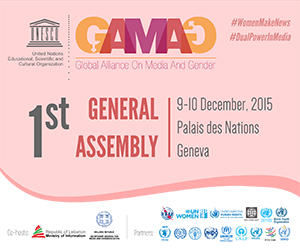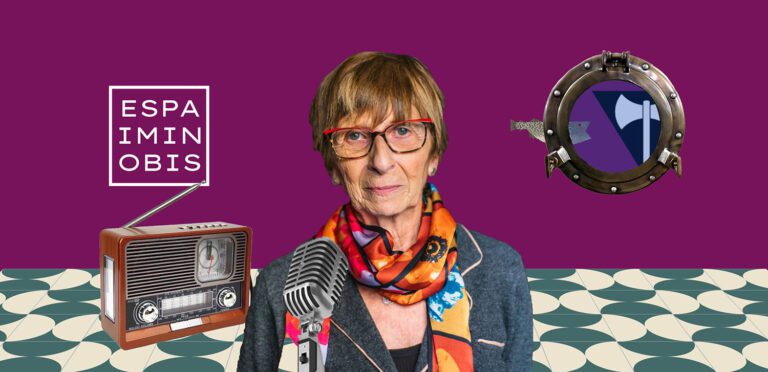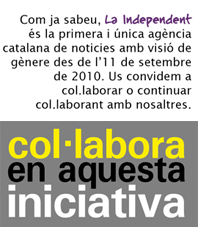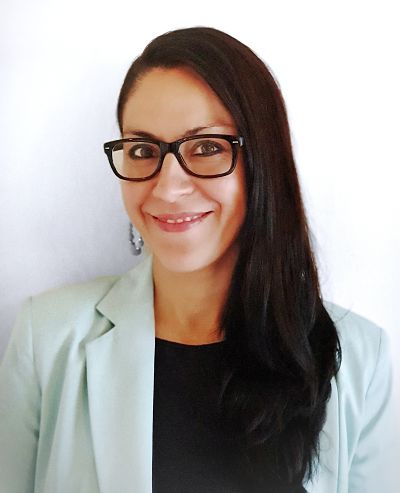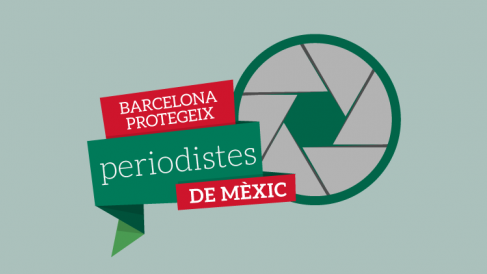Sepi Roshan es una experta en comunicació, empresa, lideratge i habilitats de comunicació d’expertesa, britànica d’origen iranià. Aquesta experta comunicadora va presidir magníficament un debat sobre “Utilització de l’accés a la informació i la llibertat d’expressió per millorar la igualtat de gènere en els mitjans de comunicació”.
Hi van participar com a expertes i experts Elena Chiaberge de la COPEAM, Mahassen Al Emam, directora del Arab Woman Media Centre, Nii Laryea Sowah, president de l’Associació privada d’Editors de Diaris i la periodista cubana, Isabel Moya Richard.
Sepi Roshan, a través d’Astute Radio, es dedica a empoderar a les dones per trobar la seva pròpia veu a través d’aquest mitjà de comunicació.
Astute Radio reforça la veu de les dones i, en fer-ho desafien els estereotips de gènere que hi ha a la societat. “La llibertat d’expressió comença a casa i cal pensar com deixem a la llibertat ser protagonista en la nostra pròpia esfera”.
A continuació algunes ponències en anglès:
—-
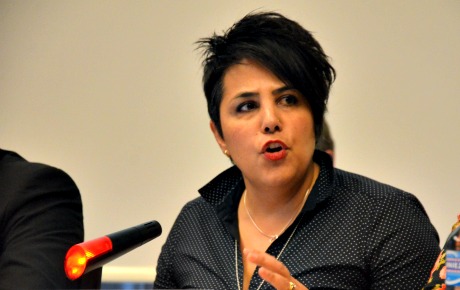
Sepi Roshan: We have spoken a lot about communication
Welcome everyone to this parallel session, “Utilising Access to Information and Media Freedom, Provisions to Enhance Gender Equality in and through the Media”.
This week, we have spoken a lot about communication, leadership and media skills. As an expert in these areas, these are the tools I use to empower women find their true voice. I work with women who do not fit the narrow and one-dimensional definition of woman or girl reinforced by media. These includes ethnic minorities, LGBT, disabled women, and women living so-called “unconventional” lives. The ones who have different and often unrepresented views.
Astute Radio strengthens the voices of these women and by doing so, we challenge gender and other stereotypes. These women are leaders and role models because they break the mould imposed on them. They have a different narrative to share.
By providing our audience access to such information and allowing the women I work with the freedom to express themselves, I change mindsets. These women become their own champions of change. Simply putting a microphone in front of a woman and asking her to say what everyone else is saying, will not change the status quo.
And let me tell you – changing mindsets is possible. The women I work with learn to ask questions and redefine how they see themselves. They speak more confidently about the things that truly matter to them. As audiences access new information, this audience thinks about how their own unconscious biases and stereotypes constrain their choices.
To change the way we see ourselves and the our fellow humans – to educate ourselves – we need access to diverse facts, opinions and experiences. So where does the media fit into this?
As a powerful force, when the intention of an ethical media is to educate rather than only make profit or perpetuate narrow perspectives, there needs to be media freedom.
How fitting that today, 10 December, 2015, is Human Rights Day because Article 19 of the UNs’ 1948 Universal Declaration of Human Rights states: “Everyone has the right to freedom of opinion and expression; this right includes freedom to hold opinions without interference, and impart information and ideas through any media regardless of frontiers”.
Let’s quickly break down these concepts.
We all exercise freedom of expression every time we share facts, information or a point of view. We share information to differing degrees, depending on certain constraints such as privacy, defamation laws and very importantly, how safe we feel expressing ourselves.
Freedom of information is the right for anyone to access information held by public bodies and agencies, to examine it and seek clarification where needed. In principle, media should be free to seek, receive and impart information through various means without interference. Transparency of governments, corporates and other institutions is vital given the large quantities of data they hold about us and the decisions they make on our behalf. World Press Freedom Day on 3 May is a reminder to governments of their duty to respect and uphold the right to freedom of expression enshrined under Article 19.
Access to information is the ability to obtain the information you want when you want it. As the world becomes more digitalised, access to Information and Communication Technologies (ICT) becomes critical to these concepts. Promoting gender equality in and through media requires supporting the means of communication, including broadcast reception quality, electricity supplies, access to telephone networks, smart phones versus dumb phones, and the internet. In many parts of the world there is little or no access to ICT and women are the worst affected. In such environments, freedom provisions mean little.
Access to information and freedom provisions are important for everyone – women and men. However, the relationship of women and men with the media is not equal.
We know diversity leads to better outcomes but it is a fact that men outnumber women in decision making roles within media organisations. And we know that decision makers hold the key to change. The legacy is that a prevailing mindset dominates the way our information is produced and disseminated.
For example, in the UK where I am based, the number of women on boards in the broadcast industry at last count was 26 percent. Ironically, these are the same media organisations trumpeting the need for more women on FTSE boards. While Sheryl Sandberg of Facebook is telling women to lean in, we must be aware that there are only two women on Facebook’s executive board out of 14 directors.
If democracy depends on people’s ability to express themselves to shape the society they live in, who is shaping our society? Men generally outnumber women as experts, contributors and guests by 4-1. In flagship news programmes we are 2.5 times more likely to see male presenters and reporters than female presenters and reporters. These statistics are worse for ethnic minority, LGBT and disable women, and women over 50 years old.
Women in decision making roles in media organisations increase the likelihood of news subjects including females, stories highlighting gender inequalities and are more likely to challenge stereotypes. Women do not generally own the media, govern the media, develop policies or have security within their jobs. I am a proud minority – breaking the mould of media owners and challenging the status quo.
Access to information and media freedom, are especially important for female audiences. Knowledge is power. For example, information about pay gaps, board composition, laws, policies, sexual and reproductive rights, role models, financial interests, access to microfinance, information about how to protect yourself when caring for family with infectious diseases, help women survive and prosper.
But, applying the principles of access to information and media freedom is sometimes deadly. Since the year 2000, over 600 journalists and media workers have been killed. On the 25th of November, the International Day of Elimination of Violence Against Women, the International Federation of Journalists highlighted the rise in cyber-bullying and threats specifically to female journalists. Threats and violence, including rape, can impinge on democracy when half the population is silenced either by others or self-censor to avoid harm to themselves or their families.
Freedom of expression and equality are aligned. Using freedom of expression provisions to silence women through cyber-bullying and threats goes against the very foundations and principles it was founded on.
This session’s theme brings up so many questions about how the media industry operates, its content and the landscape in which it functions. With my finance and compliance background, the questions I ask for example are: What effective governance and accountability mechanisms are in place around media ownership? How is access to ICT managed? Who are the venture capitalists who fund emerging telecommunications, technology and media companies? Why do they fund them and do they consider gender equality in their decisions? What are the implications of the digital by default trend – where governments and businesses force people online? Should an algorithm or robot personalises media content based on what it thinks we should see? Why is it that if you and I search for the same term, we get different results? Why does paid for content rank higher in searches? What is the balance between profit and our right to information and freedom of expression? In a “profit-at-all-costs” economic model, it seems gender equality has been the big loser.
We must therefore be clear about what media is for. Is it for information, entertainment or just business?
What does media freedom mean if there are multiple sources of information but people do not have the skills to critically examine that information? Media and information literacy helps evaluate presentation styles, biases and other possible interpretations of what is being presented. Mindlessly consuming information is dangerous and can perpetuate gender stereotypes and inequality.
The most insidious are stereotypes that reduce women and girls to sexual objects – thereby limiting their life choices. These stereotypes are so embedded and reinforced that when women and girls are not limited by others, they unwittingly limit themselves.
Despite prevailing messages women are more than their bodies. They contribute to science, technology, knowledge and the advancement of society. Without access to records, statistics and information, without the freedom to go outside conventional models and thinking, how will we hear about Rosalind Franklin who helped discover DNA, Dorothy Height, an activist, or challenge the notion that we have reached equality, as some people think is the case?
Without access to information and freedom provisions how can we expose policies and prejudicial mechanisms which violate our rights and democracy? Conversely, how can we champion those people and mechanisms upholding our rights if we do not know about them due to censorship in whatever form it takes? We need access to information and freedom provisions to involve ourselves in public debates and consultations – to get our voices heard.
Today we have considered some of the ways utilising access to information and media freedom provision enhance gender equality in and through the media. When these principles are applied in the spirit they were developed, we can reasonably expect quality content, representation and value from media.
It is undeniable. Knowledge is power. Access to information and freedom provisions can help expose policies and prejudicial mechanisms and champion what enhances equality.
In the short term, while we wait for the content and representation of women in the media to evolve, developing greater media and information literacy, can help us critically evaluate the information we consume.
Freedom of expression starts at home and we must all think about how we are promoting with this within our own sphere.
—-
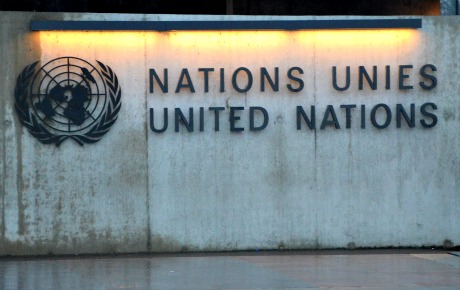
Nii Laryea Sowah: Women, students i development in the media
First and foremost let me take this opportunity to thank UNESCO and the Global Alliance on Media & Gender (GAMAG) for extending an invitation to me to represent my Association and by extension my noble country Ghana at this summit.
The topic – “UTILISING ACCESS TO INFORMATION & MEDIA FREEDOM PROVISIONS TO ENHANCE GENDER EQUALITY IN THE MEDIA” is apt and worth discussing at a time when the United Nations has set out clear goals and targets in the newly launched SUSTAINABLE DEV. GOALS during the 70th Anniversary celebration in New York in September 2015.
The Media in Ghana is one of the freest on the African Continent rubbing shoulders with only Namibia and Cape Verde. Chapter 12 of the 4th Republican 1992 Constitution clearly spells out the role of the Media with enough guarantees to ensure fundamental freedoms. Media practitioners and all major stakeholders who fought for our total liberation from the clutches of dictatorial regime prior to 1992 democratic governance have practicalised the formation of powerful Media Associations and organisations. Thus all the major players operating within the media landscape in Ghana have well organised Associations which includes but not limited to the following: the Ghana Journalists Association (GJA); the Private Newspaper Publishers Association of Ghana (PRINPAG); the Ghana Independent Broadcasters Association (GIBA); Community Radio Network; Bloggers Association; Editor Forum of Ghana and of course Women-in-the Media Network.
WOMEN LEADERS IN THE MEDIA
It is worthy to note that the above Associations which are also civil society groups are led by women in the media. The Private Newspaper Publishers Association of Ghana (PRINPAG) is led by Mrs. Gina Blay, Publisher and Owner of the “Daily Guide” Group of Newspapers. Similarly the Editors Forum is led by Ms. Adwoa Yeboah-Afari, a veteran freelance journalist. The Community Radio Network made up of radio stations operating in rural Ghana also has a female Founder and President Mrs. Quamine. Until recently the Ghana Journalists Association was led by a veteran broadcaster and women’s right advocate Mrs. Gifty Afenyi –Dadzie who by far has been the most successful President of the Journalists Association since it was founded in 1949. She is credited as the initiator of the current imposing Ghana International Press Centre Office project which is rated as the best in Africa. She revived the prestigious Ghana Journalists Awards. In 2013 a female journalist Mabel Aku Banesseh from Ghana’s leading Newspaper the “Daily Graphic” won the prestigious “Journalist of the Year Award-2013”. 14 other awardees were female journalists out of the total number of 24 award winners in various categories. Currently, the Ghana Journalists Association (GJA) has 3 of their executives being women out of the 7-member executive body.
Mr. Chairman, Ghana has a Media Regulatory Body – an 18-member National Media Commission tasked by the 1992 Constitution to uphold and defend media freedom and ensure high journalistic standards as well as insulate the state-owned media from governmental control. The Commission has achieved a lot since it was constituted in 1993. The Board and Chief Executives of all the 4 state-owned media organisations. Viz Graphic Group Communications Ltd, the New Times Corporation, the Ghana News Agency and the public service broadcaster, the Ghana Broadcasting Corporation are appointed by the National Media Commission. These appointments were originally the preserve of government in power. The Commission has encouraged the nomination of women to serve on the various Boards with the latest appointment of a woman as the Chief Executive of the New Times Corporation, the first in the history of that state-owned media set up by the first President, Dr. Kwame Nkrumah in 1958 shortly after Independence in March 1957.
FEMALE STUDENTS ENROLMENT
Distinguished fellow panelists, and delegates I believe you will all agree with me that access to information and media freedom provisions to enhance gender equality in the media to a very large extent starts from the enrolment stage ie. access to training. Journalism and Communications Institutions therefore hold the key. I am therefore proud to state heretofore that Ghana’s premier tertiary institution, the University of Ghana School of Communications Studies is headed by a female lecturer, Prof. Audrey Gadzekpo who continues to be an inspiration to many young female student journalists in our noble country. Her faculty at the moment has enrolled 46 students with 22 female students. The other distinguished journalism training institution the Ghana Institute of Journalism (GIJ) has enrolled 59% of female student journalists out of a total of over 3000 students.
The above illustration is a clear manifestation of where the media in Ghana has reached so far. There are over 291 Radio Stations all over Ghana employing mostly young female broadcasters. We also have 72 independent television channels engaging the services of well-educated female broadcast journalists and local language experts especially in news-casting.
At this stage let me state here emphatically that the above practical illustrations and media pluralism that Ghana is enjoying today was not achieved overnight. We managed to overcome a lot of media threat and culture of indignities from previous military regimes through the enforcement of the Criminal Libel and Sedition Laws. Some of our colleagues were unjustifiably imprisoned. Some female journalists were attacked at state functions, with no avenues for redress. However, by April 2001 during the “wee hours” of Ex-President John Agyekum Kufuor’s regime, the leadership of the Private Newspaper Publishers Association , the Ghana Journalists Association as well as the West African Journalists Association met the Parliamentary Select Committee on Legal, Constitutional and Subsidiary Legislation. The resultant effect was to expunge the “CRIMINAL LIBEL LAW” from our Statute Book – Ghana’s Criminal Code of 1960. This singular achievement by the Kufuor Administration opened the floodgate for a liberal media regime which has encouraged more women to get involved in media practice in Ghana. Let me also confess that Ghana’s current President John Dramani Mahama has exhibited a high sense of commitment to Media freedom which has created a free media environment thus helping to build an open society in Ghana.
In conclusion, I wish to remind the GAMAG and UNESCO in particular that, Ghana’s Parliament is yet to pass the “RIGHT TO ACCESS TO INFORMATION BILL” into law. Dialogue on the DRAFT BILL has unnecessarily dragged on for a long period of almost 17 years. Civil Society groups and media associations as well as the regulatory body have all engaged the Parliamentary Select Committee on Information & Communication at various stages and at various conferences. We believe the UN Sustainable Development Goals include an unprecedented pledge by all countries to “ensure public access to information”. There is the need for African Leaders to show commitment for an independent media and the free flow of information in African society. Let me use this platform to ask African Leaders to create a political picture of openness, accountability and transparency, the absence of which has given rise to endemic corruption at the apex of the governance systems on the African Continent. They must also strive for equity in the distribution of Africa’s rich resources for the benefits of Africans and the world’s poorest.
The above notwithstanding, media stakeholders in Ghana with all the resource constraints continue to champion the access to information and media freedom provisions to enhance gender equality in the media in practical fulfillment of the United Nation’s SUSTAINABLE DEVELOPMENT GOALS: Goals 5 y16.
The following proposals could go a long way to make Gender Equality in the Media achievable:
1. Firstly, the availability of funding for enrolment of women in Media Practice in the various Journalism Universities for diploma and degree courses.
2. Secondly, capacity building for women in the Media for short courses to upgrade their knowledge to learn new technological methods and managerial expertise in new Media Business Modules.
3. Funding support for women in the media to attend International Conferences for exposure and to gain self-confidence and courage in the discharge of their duties.
Distinguished Delegates, Thank you for your attention.

